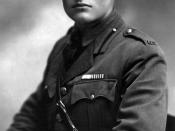Ernest Hemingway's "Soldier's Home" has received much attention, especially from the Vietnam-era baby boomers. Like many of his pieces, the story is much more complex then it seems on the surface. Mr. Hemingway is renowned for his description, though he is sometimes criticized for the seeming simplicity of "Soldier's Home." Upon closer examination, the story becomes not only a simple tale of a young man returning from war, but also a story of a commonplace struggle, portrayed through the eyes of young Krebs. This style of simplicity and implied meaning is a trademark of Ernest Hemingway, and is what sets him apart from many other writers.
I agree with those claiming that the story of Krebs is based of the life experience of young Ernest Hemingway. Mr. Hemingway was also a WWI veteran, and faced similar problems when he returned home. He too arrived far after the soldier's welcome was over, and also lost faith in the comforting institutions of family values, tradition, and religion.
Because of his unique tie to Krebs, the story flows easily and comes to life for the reader. Hemingway's liberal use of vague passages is an unusual trait in his stories, for he is often noted for his specific writing. These passages were included to show the mindset of young Krebs. For instance, the author spends several paragraphs showing the reader Krebs' thoughts on girls; specifically why he does not want to bother with them even though he admires them. In paragraph 12, Krebs tells the reader that he does not want the consequences of a girl, and then goes off on a tangent about men and what girls mean to them. This passage is vague, and does not seem to contribute to the plot. However, it serves to show the...


